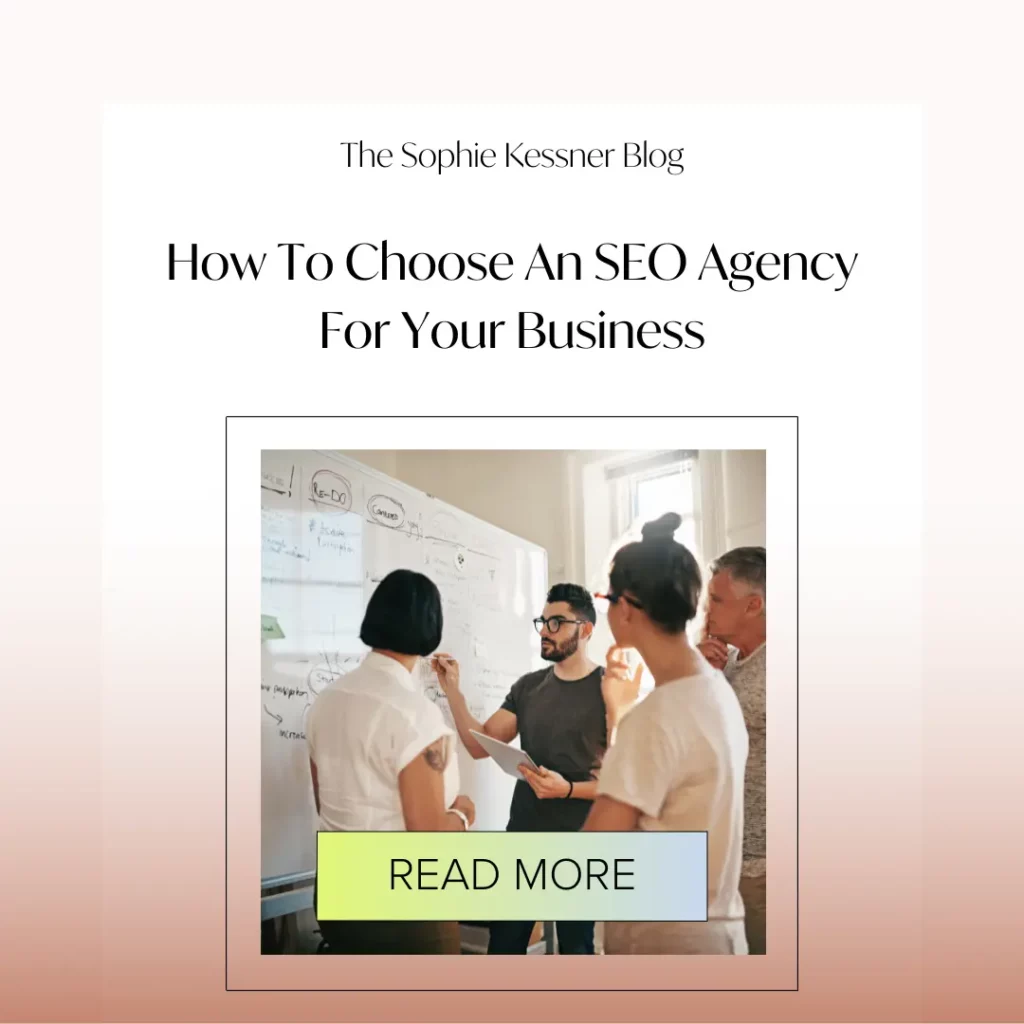Search Engine Optimization (SEO) isn’t just a nice-to-have—it’s a key part of building visibility and attracting the right people to your website. But with algorithms constantly changing and best practices shifting, many businesses face challenges in creating and implementing effective SEO strategies, making it quickly become overwhelming. Hiring the right SEO agency saves time and helps you get better results with less guesswork. For every dollar spent on SEO, businesses earn an average of over $22, highlighting SEO as a cost-effective strategy with substantial returns. Still, not all agencies are the same, and picking the wrong one can waste time and money. This guide breaks down how to choose an SEO agency that fits your business, your goals, and you.
What is an SEO Agency?
An SEO agency is a specialized company dedicated to enhancing a website’s visibility on search engine results pages (SERPs). These agencies employ a team of SEO experts who utilize a variety of SEO strategies to improve a website’s ranking, drive organic traffic, and increase conversions. A reputable SEO agency can significantly boost your digital marketing efforts by offering customized SEO services tailored to your business needs. These services often include technical SEO, local SEO, and content creation, all aimed at optimizing your site for better performance in search engine results. By leveraging the expertise of an SEO agency, businesses can achieve sustainable growth and a stronger online presence.
Why You Need an SEO Agency and What Modern SEO Really Means
Why SEO matters
If people can’t find your website, they can’t buy from you. SEO works when implemented by experts, leading to improved search engine rankings and business growth. That’s what SEO is all about—getting your site in front of the right people when they’re searching online. But good SEO isn’t just stuffing keywords on a page anymore. It’s a full-time job that covers way more than most people expect. 53% of website traffic comes from organic search, which underscores the importance of SEO in attracting visitors without relying solely on paid ads.
91% of marketers say SEO positively impacted website goals and performance in 2024, reflecting the widespread recognition of SEO’s benefits. Search engines like Google change their rules constantly. What worked last year might hurt you this year. Trying to keep up while running a business is tough. That’s why many companies hire an SEO agency—they bring the skills and focus needed to get real results without wasting time.
What makes SEO complex today
SEO now covers a wide range of tasks and strategies. Understanding diverse SEO tactics that align with specific business needs and industry requirements is crucial for achieving optimal results. Here’s what modern SEO includes:
Keyword research: It’s not just about finding popular words. It’s about understanding what your audience is really searching for—and why.
Search intent: You need to know whether someone wants to buy, learn, or compare before you create content.
Technical SEO: Site speed, mobile-friendliness, crawl errors, broken links—all of this affects your ranking.
On-page optimization: This covers titles, headings, images, meta descriptions, internal links, and how easy your content is to read.
Off-page SEO and link building: Earning trustworthy backlinks from other websites shows search engines that your content is worth ranking.
Content strategy: Regular, high-quality content that answers real questions helps keep your site active and relevant.
Conversion rate optimization (CRO): It’s not just about traffic—it’s about getting visitors to take action.
Analytics and reporting: Agencies track what’s working (and what’s not) so they can adjust your strategy over time.
AEO (Answer Engine Optimization): Getting featured in snippets or voice search results is part of the game now.
Web development: If your site isn’t built well, even the best SEO strategy won’t perform.
Why hire an agency?
An agency has a team of specialists who live and breathe SEO. They’ve seen what works, what fails, and how to fix it. If you’re serious about growing your online presence, working with pros can save you time, stress, and missed opportunities.
Define Your Goals, Budget, and Business Needs First

Before you start looking for the right SEO company, whether you’re a small startup, a medium-sized business, or a larger organization, it’s important to get clear on what you actually want. Skipping this step is one of the most common mistakes businesses make. If you don’t know what success looks like for you, it’s going to be hard to spot the agency that can help you get there.
Set clear SEO goals
What are you hoping to improve? Be as specific as you can. Some common goals include:
Getting more organic traffic to your website
Ranking for high-intent keywords
Increasing online sales or lead form submissions
Building visibility in a certain location or niche
Competing with bigger players in your industry
Once you define your goals, break them down into measurable targets. Think: “Increase organic traffic by 30% in 6 months” or “Rank on page 1 for [specific keyword] by Q3.” Clear goals help agencies create better strategies and give you something to measure progress against. It is also crucial to outline expectations and goals as a foundational step before engaging with an SEO agency.
Understand your audience
Who are you trying to reach? The more an agency knows about your ideal customer, the better they can tailor content, keyword targeting, and messaging.
Think about:
What your audience is searching for
Their problems, questions, and buying habits
Where they hang out online
The words they actually use (not just industry jargon)
If you’re unsure about this, it’s worth doing some light research or asking an agency to help you figure it out.
Know your competitors
Make a list of your top online competitors—especially the ones who are ranking well in search results. A good agency will analyze what they’re doing right and build a plan to outperform them.
Get real about your budget
SEO isn’t cheap, but it’s an investment that pays off over time. Know what you’re comfortable spending each month or quarter, and remember:
Cheap SEO often leads to poor work or black-hat tactics
Agencies usually offer retainer plans, one-time audits, or project-based packages
You don’t have to go with the most expensive option—but you shouldn’t go with the cheapest either
It’s crucial to understand the service packages pricing offered by SEO agencies and compare these options carefully. Pricing structures can vary significantly and include different scopes of work, so finding a model that aligns with your preferences is essential.
If your budget is tight, ask about ways to start small and scale as you grow.
Set your timeline
SEO takes time. Don’t expect page-one results in a few weeks. Most agencies will tell you that real growth takes at least 3–6 months, depending on your site and industry.
If you need fast results, consider pairing SEO with short-term strategies like PPC or paid social.
Final tip
Write all this down. When it’s time to talk to agencies, having your goals, budget, and expectations in front of you will help you ask better questions—and spot the right fit faster.
Understanding SEO Services

Types of SEO Services
SEO agencies offer a comprehensive range of services designed to enhance a website’s performance and visibility in search engine results. These services can be broadly categorized into on-page SEO, off-page SEO, technical SEO, and local SEO.
On-page SEO involves optimizing individual web pages to rank higher and earn more relevant traffic. This includes refining meta tags, improving content quality, and ensuring proper internal linking.
Off-page SEO focuses on activities outside your website that impact your rankings. This includes building high-quality backlinks, engaging in social media marketing, and promoting content across various platforms.
Technical SEO addresses the backend aspects of your website, such as site architecture, mobile-friendliness, and page speed optimization. These elements are crucial for ensuring that search engines can crawl and index your site effectively.
Local SEO is essential for businesses targeting local markets. It involves optimizing your website for local search queries, managing local listings, and creating location-specific content to improve your search visibility in local search results.
By offering these diverse services, many SEO companies help businesses improve their search engine rankings, drive more organic traffic, and achieve their digital marketing goals.
How to Find Potential SEO Agencies
Once you know what you need, it’s time to start your search. The good news? There are tons of SEO agencies out there. The bad news? Not all of them are good. So where should you look?
Use Google
Start by searching terms like:
“SEO agency for small businesses”
“SEO agency for [your industry]”
“local SEO company in [your city]”
The ones that show up at the top are probably doing something right. Just make sure to go beyond the homepage—check their blog, services, and case studies too.
Additionally, utilize online resources such as social media and online reviews to identify suitable SEO agencies and evaluate their credibility and success stories.
Ask people you trust
Referrals go a long way. Talk to:
Business friends
Your web designer or developer
Networking groups or online communities
If someone had a good (or bad) experience, you’ll want to hear about it.
Check LinkedIn and social platforms
Some agencies are very active on social media. They share tips, updates, and behind-the-scenes content that give you a feel for how they work. Look for:
Consistent posting
Helpful SEO advice (not just salesy posts)
Engagement with their audience
Consider niche expertise
If your business is in a specific industry—like healthcare, SaaS, or e-commerce—look for agencies that have experience in that space. They’ll understand your audience and competition faster, and they may already know what strategies work best for your type of business.
How to Evaluate an SEO Agency

You’ve got a shortlist—great. Now it’s time to figure out which agencies actually know their stuff and which ones just talk a good game. Here’s what to look for when reviewing your options.
1. Experience and Expertise
SEO takes more than a few blog posts and some keyword tools. The agency should have real-world experience helping businesses grow with SEO.
It’s crucial to evaluate the company’s ability by reviewing their portfolio and success stories to ensure they can meet your expectations and handle diverse business needs.
Ask yourself:
Have they worked in SEO for several years?
Do they have results they can show?
Have they worked with businesses like yours?
Look for:
Case studies showing improved traffic, rankings, or conversions
Testimonials from real clients (ideally with names and businesses you can verify)
A blog or knowledge hub that proves they stay current
You want someone who understands today’s SEO, not someone stuck in 2013.
2. Industry Knowledge
Every industry has its quirks—whether it’s legal, e-commerce, healthcare, or SaaS. A good SEO company won’t need to start from scratch to understand your space.
Check:
Have they worked with similar companies?
Do they ask good questions about your business, goals, and target audience?
Can they explain how they’d approach SEO for your specific industry?
A reputable SEO company listens, learns quickly, and offers ideas that make sense for your world.
3. Services Offered
SEO is rarely a one-and-done job. It touches everything from your website to your content to your data. Make sure the agency offers the services you actually need.
A well-structured SEO campaign is essential for boosting website rankings and tracking success over time, which ultimately contributes to the overall growth of your business.
Some key services might include:
Technical SEO (site audits, fixing crawl errors, improving page speed)
Keyword research and content strategy
On-page SEO (titles, meta tags, internal links)
Link building (real, not spammy)
Content writing or blogging
Local SEO for businesses with physical locations
Conversion rate optimization (turning traffic into sales or leads)
Analytics and monthly reporting
Bonus: Some agencies also offer web design, branding, or paid ads. If you want one team to handle everything, look for a full-service agency.
4. Team and Culture Fit
You’ll be working with this team regularly, so it matters who they are and how they communicate.
Ask:
Will you get a dedicated account manager or strategist?
Who’s doing the actual work—an in-house team or freelancers?
Are they clear, friendly, and responsive?
Do they feel like someone you’d enjoy collaborating with?
You’re looking for a partner, not just a vendor. Trust your gut here.
5. Tools and Tech
SEO agencies use tools to do keyword research, track specific serp ranking, monitor technical issues, and analyze performance. Ask which tools they use and why.
Some solid tools include:
Ahrefs or SEMrush (keyword and competitor research)
Google Analytics and Google Search Console
Screaming Frog or Sitebulb (technical audits)
SurferSEO or Clearscope (content optimization)
Looker Studio (for custom dashboards and reporting)
If they have their own custom tools, ask how those work and whether you’ll get access to them.
6. Reporting and Communication
SEO should never feel like a black box. A great agency will explain what they’re doing and why.
It is crucial to set reasonable expectations and maintain clear communication about the long-term nature of SEO strategies to avoid disappointment.
Look for:
Regular updates (weekly, biweekly, or monthly)
Clear reports showing traffic, rankings, leads, and next steps
Transparency about wins, losses, and what’s coming next
Ask:
How do you report on progress?
What metrics will we track?
How often will we meet or check in?
If their answers are vague or filled with jargon, that’s a red flag.
7. Case Studies and Past Results
The best agencies can show you how they’ve helped others. Look for proof—not just promises.
Ask to see:
Before-and-after traffic reports
Keyword ranking improvements
Lead or revenue growth
Campaigns that brought real results
And don’t just skim. Ask about the strategy behind the results.
Example: Did they boost traffic with a new blog strategy? Did they fix major technical issues? Did they earn high-quality backlinks that improved authority?
The more specific the examples, the more confident you can be.
Quick Red Flags to Watch Out For
Even if an agency looks great on paper, pay attention to your interactions. Warning signs include:
Vague answers or dodging your questions
Overpromising (like “We guarantee page-one rankings in 30 days”)
Not asking about your goals or audience
Pressure to sign a long contract before they’ve even reviewed your site
A good agency will want to understand your business first—not rush you into a deal.
Ask These Questions
Here’s a quick list of questions you can use in discovery calls or emails:
What does your SEO process look like from start to finish?
Who will be working on my account?
How do you stay up-to-date with Google changes?
What results have you gotten for businesses like mine?
How do you measure success?
How often will we meet or communicate?
Can I see a sample report?
The answers should be clear, specific, and jargon-free.
Understanding Pricing Models and Setting Your Budget

When it comes to hiring an SEO firm or agency, one of the first things you’ll discuss is pricing. SEO isn’t cheap, but it’s a smart investment if you choose an SEO company that aligns with your business goals and delivers real results. To make sure you get the most value, you need to understand the different pricing models and what you’re paying for.
Common SEO Pricing Models
SEO agencies offer a few different ways to charge for their services. Here’s a breakdown of the most common models:
1. Project-Based Pricing
This is a one-time fee for a specific project, like an SEO audit or a website overhaul. It’s a good option if you just need a quick fix or are testing out an agency’s services before committing to a long-term relationship.
Examples of project-based services include:
Site audits
Keyword research and strategy
On-page SEO improvements
Pros:
Clear, one-time cost
Perfect for smaller, short-term needs
Cons:
Limited scope—doesn’t help with long-term SEO growth
2. Monthly Retainer
A retainer is a recurring monthly fee for ongoing SEO work. This is ideal for businesses that want to see sustained growth and long-term results. You’ll typically get a dedicated seo team working on your account, and they’ll adjust strategies as your needs evolve.
Pros:
Continuous monitoring and optimization
Can scale with your business growth
Regular reporting and communication
Cons:
Higher ongoing cost compared to project-based pricing
3. Hourly Consulting
Some agencies offer hourly rates for consultation or specific tasks. This model is flexible and can work if you just need advice or specific help with one part of your SEO.
Pros:
Flexibility to work on short-term tasks
Pay only for the time spent
Cons:
Costs can add up quickly
Doesn’t provide the ongoing strategy or execution you might need
Setting Your Budget
SEO pricing varies depending on factors like:
Scope of services: More comprehensive work (e.g., full-site optimization, link-building campaigns) will cost more than smaller tasks (like technical audits).
Industry competition: More competitive industries (e.g., real estate, legal) require more effort to rank well, so costs can be higher.
Agency experience: Agencies with more experience and proven results typically charge more, but they can deliver better ROI.
Before you dive in, set a realistic budget that allows for long-term SEO efforts. Be prepared to invest, and keep in mind that it’s an ongoing process. SEO isn’t a quick fix, but over time, the results will pay off.
Identifying and Avoiding SEO Agency Warning Signs

Not all SEO agencies are created equal. While some are genuinely skilled and committed to driving results, others may be more focused on making quick sales than delivering real value. To avoid wasting your time and money, be on the lookout for warning signs that indicate the agency might not be right for your business.
1. Outlandish Guarantees & Promises
One of the biggest red flags is an agency that guarantees specific rankings or promises quick results. SEO is a long-term strategy, and no one can predict exactly where you’ll rank in Google. Any agency that promises top rankings in a matter of weeks or claims to “guarantee” results is probably using questionable tactics or doesn’t fully understand how search algorithms work.
Look out for:
Claims like “We guarantee page one rankings in 30 days”
Bold promises of “instant results” or “overnight success”
Lack of transparency about how they’ll actually achieve results
2. Lack of Transparency
Transparency is crucial when it comes to SEO. If the agency isn’t open about what they’re doing, why they’re doing it, and what you can expect, it’s a major red flag. You should never feel like you’re in the dark about your campaign’s progress.
Watch for:
Avoiding questions about their methods
Lack of clear reporting on metrics like traffic, rankings, or conversions
Not sharing past case studies or success stories
3. Suspiciously Low Pricing
If an agency is offering SEO services at a price that seems too good to be true, it probably is. SEO requires time, skill, and resources to get it right. Agencies that charge ridiculously low rates may be cutting corners or using unethical tactics, like buying low-quality backlinks or keyword stuffing, which can actually harm your rankings in the long run.
Red flags include:
Rates far below the industry average
Offers that sound “too good to pass up”
Promises of “fast” results for a low price
4. Lack of Experience or Results
While every agency has to start somewhere, you should be wary of agencies with little to no experience or proven results. If they can’t show you examples of their past work or provide case studies with measurable success, you may want to move on to a more established agency.
Ask for:
Case studies and results that show real, measurable improvements
Testimonials from clients in your industry or a similar market
Clear examples of their SEO work and the impact it had
5. Poor Communication or Customer Service
Good communication is key to a successful SEO partnership. If the agency is difficult to reach, doesn’t respond promptly to your questions, or seems uninterested in understanding your business, it’s a sign that they may not be the right fit.
Watch out for:
Slow or unresponsive communication
Not scheduling regular check-ins or updates
Lack of interest in your business’s specific needs
6. Black-Hat SEO Practices
Be cautious if an agency suggests or uses black hat techniques—strategies that violate Google’s guidelines and may lead to penalties. Some common black-hat tactics include:
Buying backlinks
Keyword stuffing
Cloaking (showing different content to users and search engines)
If an agency offers these shortcuts, they’re likely to harm your website’s long-term performance.
Keep an eye out for these warning signs when evaluating agencies. A trustworthy SEO partner should prioritize transparency, long-term growth, and ethical strategies. If something doesn’t feel right, it’s okay to walk away and continue your search for a better fit.
Evaluating SEO Agency Performance
Measuring Success
To evaluate an SEO agency’s performance, it’s crucial to measure success using key SEO metrics such as organic traffic, search engine rankings, and conversions. A good SEO agency should provide regular reports and updates on their SEO efforts, including keyword research, content strategy, and link-building activities.
When choosing an SEO agency, consider factors such as the agency’s track record, client references, and pricing structures. It’s essential to outline your expectations and goals clearly and ensure that the agency is a reliable partner capable of helping you achieve your business objectives. By doing so, you can ensure that you are working with a reliable SEO company that can enhance your online visibility, drive organic traffic, and increase conversions. Regular communication and transparent reporting are key to maintaining a successful partnership and achieving long-term SEO success.
Making the Final Decision and Building a Partnership
After narrowing down your options, it’s time to make the final decision and begin building a partnership with the agency you choose. This is a critical step in your business’s long-term SEO strategy, so it’s important to make an informed and thoughtful choice.
Review Your Evaluation Criteria
Go back to the key factors you’ve been evaluating, such as:
Experience and expertise: Does the agency have the necessary experience to handle your specific needs?
Understanding of your business: Do they show a genuine interest in your business and your goals?
Team fit and communication: Will you be comfortable working with their team, and do they communicate clearly?
Pricing and value: Is the agency’s pricing reasonable for the level of service they provide?
Prioritize the Right Fit
The right SEO agency isn’t just about skills and expertise; it’s also about working well together. Choose an agency that aligns with your business values, communication style, and goals. This partnership will require ongoing collaboration, so it’s important that both parties feel comfortable and motivated to succeed.
Set Clear Expectations
Before signing anything, make sure you have a clear understanding of:
Deliverables and timelines: What exactly will they be working on, and by when?
Reporting and communication: How often will you receive updates, and how will they share progress?
Payment terms: Are the terms clear, and do they fit your budget?
Building a strong partnership with the right agency can help your business grow and thrive online.
Conclusion
Choosing the right SEO agency is a crucial step in boosting your online presence and achieving long-term business success. The right agency will help you improve your search rankings and will become a trusted partner in your growth journey.
When making your decision, be sure to define clear goals, evaluate agencies based on key factors like experience, transparency, and compatibility with your business, and avoid those that make unrealistic promises.
However, if you’re looking to take control of your SEO and learn at your own pace, consider Sass and SEO’s DIY SEO courses. Our hands-on courses provide you with the skills and tools to manage your SEO strategy independently—empowering you to see measurable results without hiring an external agency. Get started today and learn how to grow your business online with confidence!
Frequently Asked Questions (FAQs)
1. Why should I hire an SEO agency?
An SEO agency brings expert knowledge and experience to help improve your website’s ranking and visibility. They stay up-to-date with changing algorithms, so you don’t have to.
2. How long does it take to see SEO results?
SEO is a long-term strategy, and it can take 3-6 months to see significant results. Patience is key as improvements are gradual and require consistent effort.
3. Can I do SEO on my own?
Yes, with the right knowledge and tools, you can handle SEO yourself. Our DIY SEO courses teach you the skills you need to optimize your site effectively.
4. What’s the difference between on-page and off-page SEO?
On-page SEO focuses on optimizing content and website structure. Off-page SEO involves building external signals like backlinks and brand mentions to improve site authority.
5. Are SEO services expensive?
SEO costs vary depending on the agency and the services offered. At Sass and SEO, we offer affordable DIY SEO courses to help businesses learn and implement effective SEO strategies themselves.





